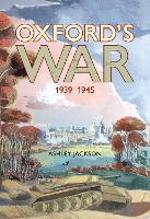Oxford played a unique part in the national endeavour to defend Britain in the Second World War. During the Blitz and beyond, thanks to its proximity to London, the city provided an alternative base for civil servants from the Ministry of Food, the Foreign Office, the Ministry of Home Security, the Ministry of Information and the Ministry of Works. The Admiralty, the War Office, the Air Ministry, MI5, and Bletchley Park all also had a presence in Oxford. Colleges became military hospitals, evacuee centres and both cadet and senior officer schools. Students fit for active service took shortened degree courses and underwent military training while they studied. Grassy quadrangles were converted into vegetable plots and the New Bodleian Library provided underground storage for treasures from Parliament and national museums. Drawing on first-hand narratives and material from University and college archives, this pioneering account reveals the essential role Oxford played in producing military intelligence, creating propaganda, and developing radar and the atomic bomb. It also explores the city’s role in bringing penicillin to market and laying the foundations of the welfare state. It shows how the Cowley car works was heavily involved in arms production and the salvage of RAF fighter planes, and also how the University provided a place of sanctuary for academics fleeing fascism who in turn made significant contributions in their fields of expertise. Together these accounts paint an extraordinary picture of the war’s profound impact on an ancient seat of learning.

Oxford’s war 1939-1945
ISBN: 9781851246137
Format: Hardback
Publisher: Bodleian Library (ADS)
Origin: GB
Release Date: January, 2025


